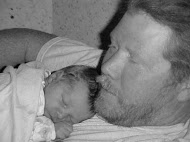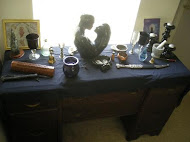The Founding Fathers Were Not Christians
In this year of presidential election, we find politics & religion to be a very popular subject. I rarely venture into the realm of politics, and even less often will you find anything even slightly derogatory towards a faith other than my own coming from my mouth (or keyboard as the case may be...). However, this particular subject - the founding fathers of The United States of America - is a subject dear to me. I am a pretty serious history buff, and I have also made a point to study faith. Of all kinds. If I wish to justify my decisions - especially to myself = then I have to have basis for them. If I don't have all the information, I can't make and informed decision...
So, in an effort to clarify some misconceptions, I have compiled some publicly available information on this subject. For more information, you can go to Freethought and read what they have to say on the subject. However, I strongly recommend you find the quoted sources, and read the entire context. Like anywhere else, quotes out of context can be misleading. I have included links to the full documents of the quotes I used whenever possible (the majority of them are to documents...). When not possible, I have linked to a location where the document or source can be purchased, if you want to go that far.
OK, I'll quit rambling now *grin*
bb
dawtch
"The Christian right is trying to rewrite the history of the United States as part of its campaign to force its religion on others. They try to depict the founding fathers as pious Christians who wanted the United States to be a Christian nation, with laws that favored Christians and Christianity. This is patently untrue. The early presidents and patriots were generally Deists or Unitarians, believing in some form of impersonal Providence but rejecting the divinity of Jesus and the absurdities of the Old and New testaments. When the Founders wrote the nation's Constitution, they specified that
"no religious test shall ever be required as a qualification to any office or public trust under the United States." (Article 6, section 3)
This provision was radical in its day - giving equal citizenship to believers and non-believers alike. They wanted to ensure that no single religion could make the claim of being the official, national religion, such as England had. Nowhere in the Constitution does it mention religion, except in exclusionary terms. The words "Jesus Christ, Christianity, Bible, and God" are never mentioned in the Constitution - not once.
The 1796 treaty with Tripoli states that the United States was "in no sense founded on the Christian religion" (see below). This was not an idle statement, meant to satisfy Muslims - they believed it and meant it. This treaty was written under the presidency of George Washington and signed under the presidency of John Adams. The treaty was written during the Washington administration, and sent to the Senate during the Adams administration. It was read aloud to the Senate, and each Senator received a printed copy. This was the 339th time that a recorded vote was required by the Senate, but only the third time a vote was unanimous (the next time was to honor George Washington). There is no record of any debate or dissension on the treaty. It was reprinted in full in three newspapers - two in Philadelphia, one in New York City. There is no record of public outcry or complaint in subsequent editions of the papers.
Thomas Paine was a pamphleteer whose manifestos encouraged the faltering spirits of the country and aided materially in winning the war of Independence:

I do not believe in the creed professed by the Jewish church, by the Roman church, by the Greek church, by the Turkish church, by the Protestant church, nor by any church that I know of...Each of those churches accuse the other of unbelief; and for my own part, I disbelieve them all." The Age of Reason by Thomas Paine
George Washington, considered the "Father of Our Country, and our first president never declared himself a Christian according to contemporary reports or in any of his voluminous correspondence. Washington championed the cause of freedom from religious intolerance and compulsion. When John Murray (a universalist who denied the existence of hell) was invited to become an army chaplain, the other chaplains petitioned Washington for his dismissal. Instead, Washington gave him the appointment.:
On his deathbed, Washington uttered no words of a religious nature and did not call for a clergyman to be in attendance. George Washington and Religion by Paul F. Boller Jr
John Adams, the country's second president, was drawn to the study of law but faced pressure from his father to become a clergyman. He wrote that he found among the lawyers 'noble and gallant achievements" but among the clergy, the "pretended sanctity of some absolute dunces".
"The priesthood have, in all ancient nations, nearly monopolized learning. And ever since the Reformation, when or where has existed a Protestant or dissenting sect who would tolerate A FREE INQUIRY? The blackest billingsgate, the most ungentlemanly insolence, the most yahooish brutality, is patiently endured, countenanced, propagated, and applauded. But touch a solemn truth in collision with a dogma of a sect, though capable of the clearest proof, and you will find you have disturbed a nest, and the hornets will swarm about your eyes and hand, and fly into your face and eyes." letter to John Taylor
It was during Adam's administration that the Senate ratified the Treaty of Peace and Friendship, which states in Article XI "the government of the United States of America is not in any sense founded on the Christian Religion."
As the third president of our country and author of the Declaration of Independence, Thomas Jefferson is one of the best known – and most esteemed – figures in American history. In addition to his authorship of the Declaration, he is also responsible for the Virginia Statute for Religious Freedom, and is called the founder of the Democratic Party. His writings have been inspirational to the people who defend freedoms – individual, spiritual, and worldly. Many of the freedoms and equalities enjoyed by Americans today are attributable directly to him. It was Thomas Jefferson who made the statement “We hold these truths to be self-evident, that all men are created equal, that they are endowed by their Creator with certain unalienable Rights, that among these are Life, Liberty and the pursuit of Happiness.”
"The Christian priesthood, finding the doctrines of Christ leveled to every understanding and too plain to need explanation, saw, in the mysticisms of Plato, materials with which they might build up an artificial system which might, from its indistinctness, admit everlasting controversy, give employment for their order, and introduce it to profit, power, and pre-eminence. The doctrines which flowed from the lips of Jesus himself are within the comprehension of a child; but thousands of volumes have not yet explained the Platonisms engrafted on them: and for this obvious reason that nonsense can never be explained."
quoting letter by Thomas Jefferson to John Adams, July 5, 1814.
"Christianity neither is, nor ever was, a part of the Common Law." letter to Dr. Thomas Cooper, 1814
"The day will come when the mystical generation of Jesus, by the supreme being as his father in the womb of a virgin, will be classed with the fable of the generation of Minerva in the brain of Jupiter." - Thomas Jefferson (letter to J. Adams April 11,1823)
James Madison, fourth president and co-father of the Constitution, was not religious in any conventional sense.
"Religious bondage shackles and debilitates the mind and unfits it for every noble enterprise." letter by James Madison to William Bradford April 1, 1774
"During almost fifteen centuries has the legal establishment of Christianity been on trial. What have been its fruits? More or less in all places, pride and indolence in the Clergy, ignorance and servility in the laity, in both, superstition, bigotry and persecution."
Memorial and Remonstrance against Religious Assessments by James Madison
Ethan Allen, whose capture of Fort Ticonderoga while commanding the Green Mountain Boys helped inspire Congress and the country to pursue the War of Independence, said,
"That Jesus Christ was not God is evidence from his own words."
p. 352 of Reason, the Only Oracle of Man and A Sense of History compiled by American Heritage Press Inc., p. 103 (1985, American Heritage Press, Inc., New York, NY.)
In the same book, Allen noted that he was generally
"denominated a Deist, the reality of which I never disputed, being conscious that I am no Christian."
When Allen married Fanny Buchanan, he stopped his own wedding ceremony when the judge asked him if he promised, "to live with Fanny Buchanan agreeable to the laws of God." Allen refused to answer until the judge agreed that the God referred to was the God of Nature, and the laws those "written in the great book of nature." referenced in Ethan Allen (1999) by John Patrick Michael Murphy
Benjamin Franklin, delegate to the Continental Congress and the Constitutional Convention, said:
"As to Jesus of Nazareth, my Opinion of whom you particularly desire, I think the System of Morals and his Religion...has received various corrupting Changes, and I have, with most of the present dissenters in England, some doubts as to his Divinity; though' it is a question I do not dogmatize upon, having never studied it, and think it needless to busy myself with it now, when I expect soon an opportunity of knowing the Truth with less trouble." He died a month later, and historians consider him, like so many great Americans of his time, to be a Deist, not a Christian. letter by BF to Ezra Stiles March 9, 1790.
The words "In God We Trust" were not consistently on all U.S. currency until 1956, during the McCarthy Hysteria.
Disclaimer: No one involved in this blog or its contents may be held responsible for any adverse reactions arising from following any of the instructions/recipes on this list. It is the reader's personal responsibility to exercise all precautions and use his or her own discretion if following any instructions or advice from this blog.
![clip_image002[4]](http://lh3.ggpht.com/rdnckwch/SOj0sTYN09I/AAAAAAAAAg4/JredLw6hi1U/clip_image002%5B4%5D_thumb.jpg?imgmax=800)
![clip_image001[4]](http://lh3.ggpht.com/rdnckwch/SOj0tnaQ3AI/AAAAAAAAAhI/r_-AVsABOY0/clip_image001%5B4%5D_thumb.jpg?imgmax=800)
![clip_image001[6]](http://lh5.ggpht.com/rdnckwch/SOj0t5aRL2I/AAAAAAAAAhQ/muZcsQdVBiU/clip_image001%5B6%5D_thumb.jpg?imgmax=800)
![clip_image001[8]](http://lh6.ggpht.com/rdnckwch/SOj0uIEFSUI/AAAAAAAAAhY/SDWr0IPOsuQ/clip_image001%5B8%5D_thumb.jpg?imgmax=800)
![clip_image001[14]](http://lh3.ggpht.com/rdnckwch/SOj0ubhpsYI/AAAAAAAAAhg/nAxpWgj-wKk/clip_image001%5B14%5D_thumb.jpg?imgmax=800)
![clip_image001[10]](http://lh4.ggpht.com/rdnckwch/SOj0u4T8MeI/AAAAAAAAAho/gkPtyrGO_qk/clip_image001%5B10%5D_thumb.jpg?imgmax=800)
![clip_image001[12]](http://lh6.ggpht.com/rdnckwch/SOj0vZEAGuI/AAAAAAAAAhw/U_3buoQnDSM/clip_image001%5B12%5D_thumb.jpg?imgmax=800)















No comments:
Post a Comment